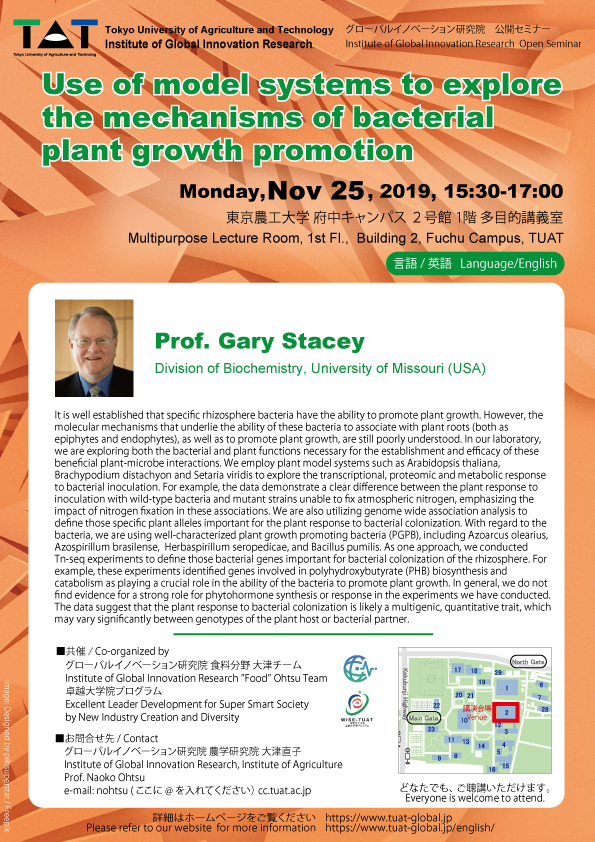Event
【GIR Open Seminar】 Dr. Gary Stacey

| Date | 2019.11.25 (15:30 - 17:00) |
|---|---|
| Venue |
Multipurpose Lecture Room, 1st Fl., Building 2, Fuchu Campus, TUAT |
| Title | "Use of model systems to explore the mechanisms of bacterial plant growth promotion" Dr. Gary Stacey (Professor, Division of Biochemistry, University of Missouri, U.S.A.) 〈Abstract〉 It is well established that specific rhizosphere bacteria have the ability to promote plant growth. However, the molecular mechanisms that underlie the ability of these bacteria to associate with plant roots (both as epiphytes and endophytes), as well as to promote plant growth, are still poorly understood. In our laboratory, we are exploring both the bacterial and plant functions necessary for the establishment and efficacy of these beneficial plant-microbe interactions. We employ plant model systems such as Arabidopsis thaliana, Brachypodium distachyon and Setaria viridis to explore the transcriptional, proteomic and metabolic response to bacterial inoculation. For example, the data demonstrate a clear difference between the plant response to inoculation with wild-type bacteria and mutant strains unable to fix atmospheric nitrogen, emphasizing the impact of nitrogen fixation in these associations. We are also utilizing genome wide association analysis to define those specific plant alleles important for the plant response to bacterial colonization. With regard to the bacteria, we are using well-characterized plant growth promoting bacteria (PGPB), including Azoarcus olearius, Azospirillum brasilense, Herbaspirillum seropedicae, and Bacillus pumilis. As one approach, we conducted Tn-seq experiments to define those bacterial genes important for bacterial colonization of the rhizosphere. For example, these experiments identified genes involved in polyhydroxybutyrate (PHB) biosynthesis and catabolism as playing a crucial role in the ability of the bacteria to promote plant growth. In general, we do not find evidence for a strong role for phytohormone synthesis or response in the experiments we have conducted. The data suggest that the plant response to bacterial colonization is likely a multigenic, quantitative trait, which may vary significantly between genotypes of the plant host or bacterial partner. |
| Language | English |
| Intended for | Everyone is welcome to attend. |
| Co-Organized by | Institute of Global Innovation “Food” Ohtsu Team Excellent Leader Development for Super Smart Society by New Industry Creation and Diversity |
| Outline | |
| Contact | Institute of Global Innovation Research, Institute of Agriculture Prof. Naoko Ohtsu e-mail: nohtsu (at) cc.tuat.ac.jp |
このページの上部へ